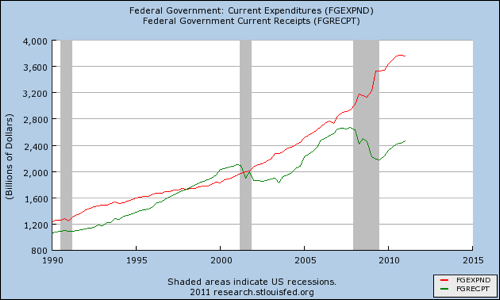

I agree with the data but don't love these graphs. They are comparing 8 years of Bush with 2.5 years of Obama and just projections for an eight-year term. It's also too easy to look at them and see the bigger lines during Obama's term.
If you look at both graphs you can piece together that the wars and tax cuts turned the surplus projections into actual deficits. You can then maybe piece together that the financial crisis led to the bailouts and stimulus. It's up to you to realize that while they hurt the budget in the short term, they're better in the long term. The chart also leaves out that the health care law is supposed to shrink the deficit after 2017 but that the costs are loaded up front.
As for the deficit I really prefer this chart, the latest version I posted a few days ago. Here's a version with recessions shaded:

This shows the revenue dropped in 2007 before the recession hit (I'm not sure why but I'll assume there was a tax cut in there) and the recession made it worse. Still I'm sure a Republican would look at this and see a spending problem, see that line just keeps going up. You have to think that things get more expensive and we get something for our money. Me, I'd rather be getting safety nets and infrastructure from our government rather than wars.
Another part I don't completely understand with this graph is that Bush cut taxes and yet clearly revenue did go up. Is that just inflation or the bubble? I assume there's something to the laffer curve but I know it doesn't mean cutting taxes always works and I thought that we were at the point that it didn't.
I do know that if you bring up to a tea partier that Bush's policies greatly exacerbated the debt problem they'll say they didn't support them either; but I never see an interviewer follow up and ask if they voted for Bush in 2004. The other annoying angle is that they will point out that Democrats were against the deficit under Bush and why don't they care now. My answer is that we're in a recession and different economic situations demand different policies. It's perfectly consistent to say you support deficit spending in bad times and making it up in surpluses during good times, in fact it's Keynesian. You can't say that the appropriate policy in every situation is cutting taxes, that's consistent but unsustainable and clearly wrong.
No comments:
Post a Comment